Physical Address
304 North Cardinal St.
Dorchester Center, MA 02124
Physical Address
304 North Cardinal St.
Dorchester Center, MA 02124

Don't let poor camping manners ruin your outdoor adventure or annoy fellow campers—these essential etiquette rules will transform you into a respectful outdoors enthusiast.
You’ve probably just finished planning your first camping trip in years, and coincidentally, your neighbor mentioned they’re heading out to the same park next weekend. Here’s the thing: nothing ruins a peaceful outdoor getaway faster than inconsiderate campers who blast music at midnight or leave trash scattered around their site. Whether you’re a seasoned outdoors enthusiast or dusting off your sleeping bag for the first time, these essential etiquette guidelines will determine whether fellow campers welcome your presence or secretly wish you’d stayed home.
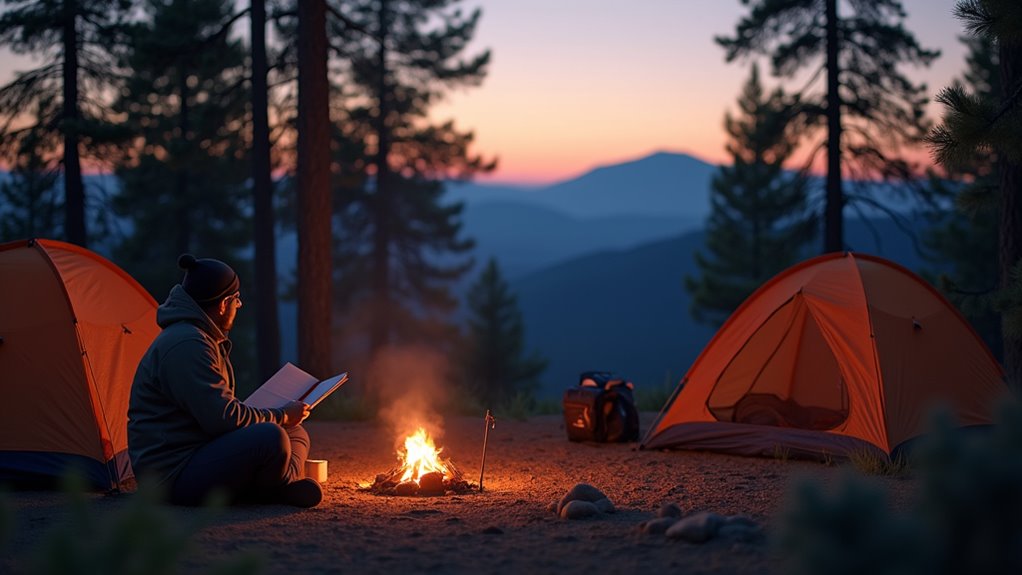
When darkness falls over the campground, you’ll want to shift into quiet mode to respect your fellow campers who might be settling in for the night. Most campgrounds enforce quiet hours between 10 PM and 6 AM, but you should check specific rules upon arrival.
Keep conversations at low volumes and avoid slamming car doors or tent zippers. If you’re planning late-night activities, move away from sleeping areas. Turn off radios, speakers, and other noise-making devices during quiet hours.
Children can be particularly challenging to manage, so establish bedtime routines early. If you’re a light sleeper, pack earplugs as backup. Remember that sound travels farther in open spaces, so what seems quiet to you might disturb others nearby.
Being respectful with noise levels is part of following Leave No Trace principles, which emphasize leaving your campsite exactly as you found it for future visitors to enjoy.
Before you even unpack your gear, take time to walk around and evaluate your options. Look for level ground that’ll accommodate your tent without rocks or roots poking through. Check overhead for dead branches that could fall during storms – they’re called “widowmakers” for good reason.
Consider your impact on the environment. Choose established campsites when available rather than creating new ones. Avoid fragile areas like meadows or near water sources where you might disturb wildlife.
Think about practical matters too. You’ll want reasonable access to water and bathrooms, but not so close that you’re dealing with constant foot traffic. Position yourself to catch morning sun if you’re an early riser, or find shade if you prefer sleeping in.
Remember that setting up camp itself can be a great workout, so embrace the physical activity of hauling gear and pitching tents as part of your outdoor adventure.
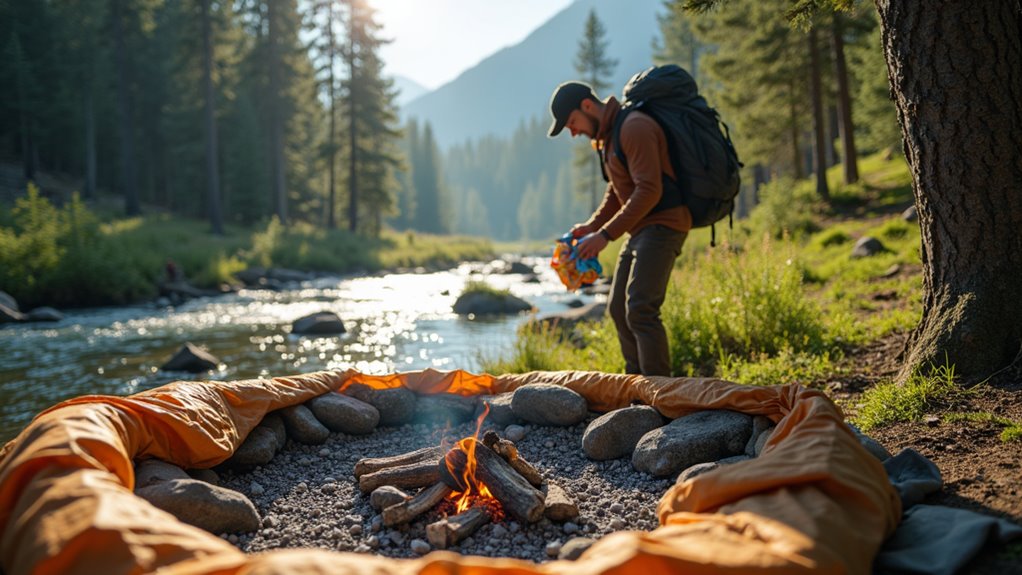
While choosing the right campsite sets you up for success, how you behave during your stay determines whether you’re a responsible camper or someone who ruins the experience for future visitors. Following Leave No Trace principles guarantees you’re protecting nature for everyone.
Pack out everything you brought in, including food scraps and toilet paper. Don’t bury trash or leftovers—animals will dig them up.
Dispose of greywater from washing dishes at least 200 feet from water sources.
Use established fire rings rather than building new ones, and completely extinguish fires before leaving.
Stay on designated trails to prevent erosion and vegetation damage.
Respect wildlife by observing from a distance and never feeding animals.
Keep noise levels reasonable, especially during quiet hours.
These same principles apply whether you’re car camping or preparing for more technical adventures like glacier climbing, where pristine wilderness preservation becomes even more critical.
Beyond protecting the environment, maintaining a tidy campsite makes your outdoor experience more enjoyable and shows respect for fellow campers. You’ll find everything quickly when your gear’s organized and your space stays clutter-free.
Set up designated areas for cooking, sleeping, and storage. Keep food sealed in containers to prevent attracting wildlife. Store trash in secured bags and pack it out when you leave. Don’t let dirty dishes pile up—wash them immediately after meals.
Organize your equipment so it’s easily accessible but doesn’t create obstacles for others walking through the area.
Before departing, do a thorough sweep to ensure you haven’t left anything behind. A clean, organized campsite reflects well on you and preserves the natural beauty for future visitors. Following proper camping etiquette ensures everyone can enjoy a respectful outdoor experience.
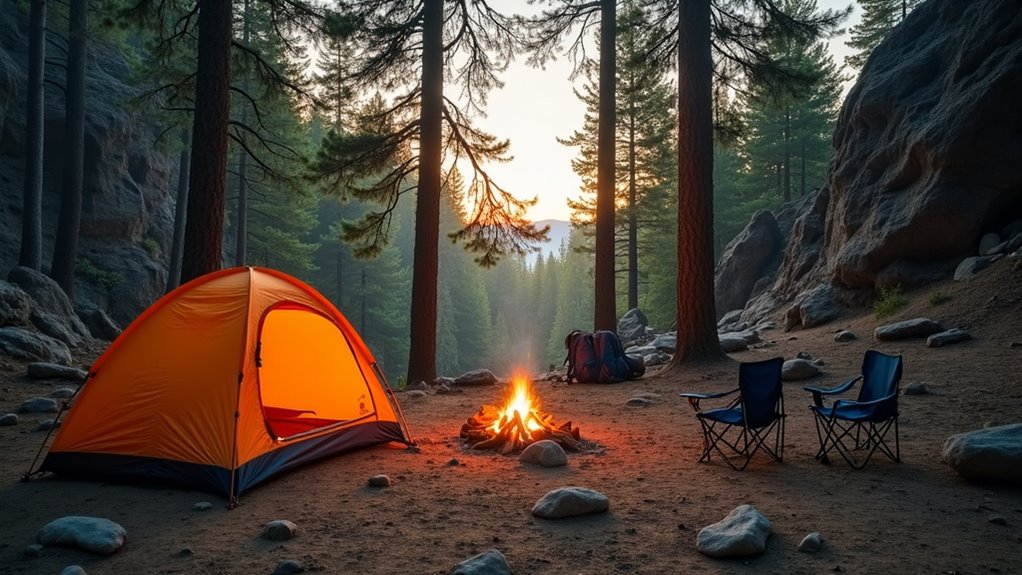
Although you’re all sharing the same outdoor space, each camping party deserves their own bubble of privacy and comfort. Keep your distance from neighboring campsites and avoid walking through them as shortcuts. Don’t peer into other people’s tents or RVs, and resist the urge to inspect their gear or setup.
Control your noise levels, especially during quiet hours. Loud conversations, music, or camp activities can easily carry across campsites and disturb others trying to relax or sleep. If you need to have a conversation with nearby campers, approach their campsite boundary and wait to be invited closer rather than barging in.
Respect personal belongings by keeping your hands off items that don’t belong to you. When nature calls, use designated facilities rather than wandering into secluded areas near other campsites. Being a respectful camper means understanding that your actions directly impact the experience of fellow outdoor enthusiasts.
Since campfires serve as the heart of many camping experiences, you’ll want to master both safety protocols and social etiquette around the flames. Always check fire restrictions before building one, and use only designated fire rings. Keep water and dirt nearby for emergencies, never leaving your fire unattended.
Don’t burn trash, plastic, or treated wood—stick to dry, local firewood to prevent spreading invasive species. Build fires at appropriate sizes; massive blazes waste resources and create safety hazards.
Respect the communal nature of campfires by asking before joining others’ circles. Keep conversations at reasonable volumes, and don’t hog seating or cooking space.
When you’re done, ensure the fire’s completely extinguished—stir ashes until they’re cold to touch. In remote areas where emergencies might occur, knowing how to create visible smoke signals can be crucial for signaling for help when traditional communication methods aren’t available.
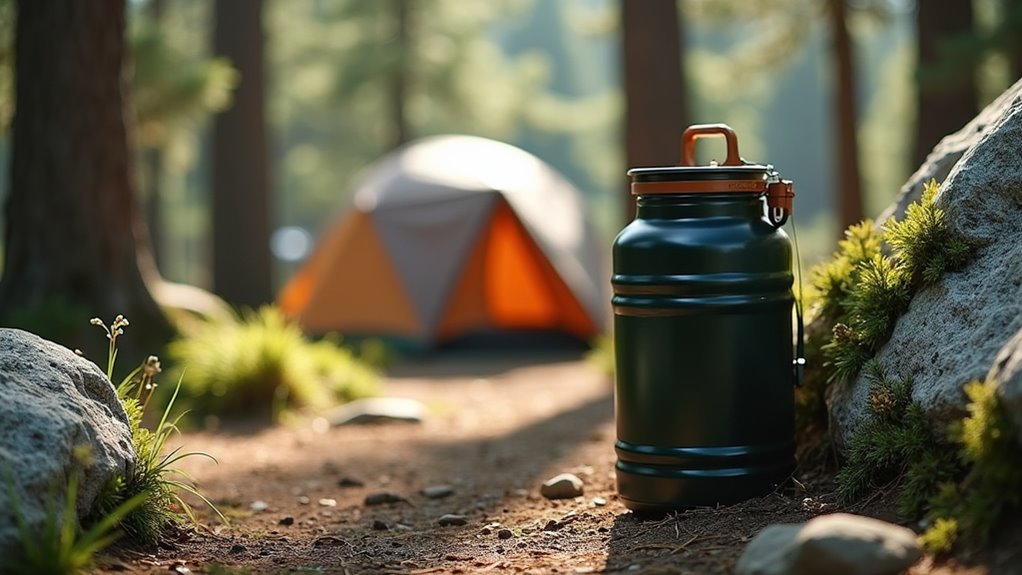
While campfires bring people together, improper food storage can attract unwanted guests that’ll turn your peaceful getaway into a dangerous situation. You must store all food, toiletries, and scented items in bear-proof containers or hang them at least 12 feet high and 4 feet from tree trunks.
Never keep food in your tent – even granola bar crumbs can draw animals. Use designated food storage lockers when available, or invest in hard-sided coolers that lock securely.
Clean up immediately after meals, washing dishes thoroughly and disposing of greywater 200 feet from your campsite. Don’t forget that toothpaste, deodorant, and soap attract wildlife too.
Proper storage protects both you and the animals from dangerous encounters.
Why do experienced hikers always stick to marked trails even when shortcuts look tempting? They understand that designated paths protect both you and the environment from serious harm.
Experienced hikers know that marked trails aren’t suggestions—they’re essential safeguards for both adventurers and fragile wilderness ecosystems.
When you venture off-trail, you’re trampling delicate vegetation that takes years to recover. You’ll also disturb wildlife habitats and contribute to erosion that damages entire ecosystems.
Plus, you’re putting yourself at risk—unmarked terrain can hide dangerous drop-offs, unstable ground, or poisonous plants.
Marked trails exist for good reason. They’re maintained, safer, and designed to minimize environmental impact.
You’ll avoid getting lost, reduce your chance of injury, and help preserve wilderness areas for future campers.
Stay on designated paths, follow trail markers, and resist the urge to create your own route. It’s responsible camping.
For cycling campers traveling worldwide, this principle becomes even more critical as different countries may have varying regulations and protected areas that require strict adherence to established routes.
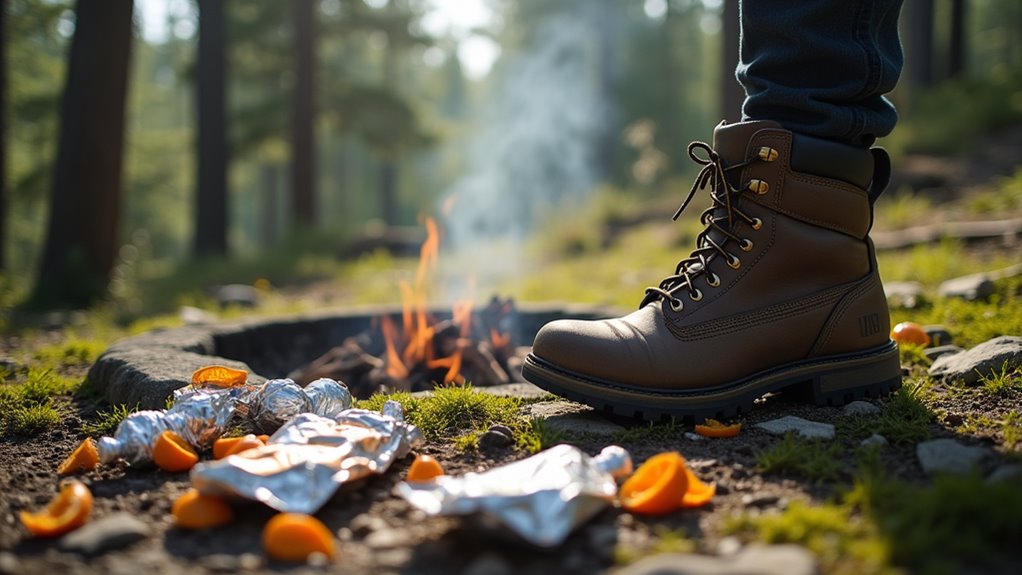
Just as you protect the environment by staying on trails, you’ll make an even bigger difference by handling your waste properly. Pack out everything you bring in—food scraps, wrappers, and toiletries all go home with you.
For human waste, dig catholes 6-8 inches deep and at least 200 feet from water sources, trails, and campsites. Bury toilet paper or better yet, pack it out in a sealed bag.
Never dump soapy water directly into streams or lakes, even if it’s biodegradable soap. Strain dishwater to remove food particles, then scatter the water at least 200 feet from water sources.
Your responsible waste disposal keeps campsites clean and protects wildlife from harmful encounters with human trash. These principles become even more critical during winter camping when cold temperatures can slow decomposition and increase environmental impact.
Since water sources in the wilderness are often limited and shared by both wildlife and fellow campers, you’ll want to use every drop wisely. Bring water from home when possible to reduce strain on natural sources.
Every drop counts in the wilderness where water sources are precious and shared by wildlife and fellow outdoor enthusiasts.
When using streams or lakes, collect water downstream from where you’ll wash dishes or bathe.
Use biodegradable soap sparingly, and wash yourself and your gear at least 200 feet away from water sources. This prevents contamination and protects aquatic ecosystems.
Consider using wet wipes for quick cleanups instead of washing with precious water.
Turn off spigots completely at developed campgrounds, and report any leaks to park staff.
Collect rainwater in tarps or containers when available.
Water conservation becomes even more critical during hot-weather camping when dehydration risks are higher and natural water sources may be more scarce.
These simple practices help preserve water for everyone while protecting the environment you’re enjoying.
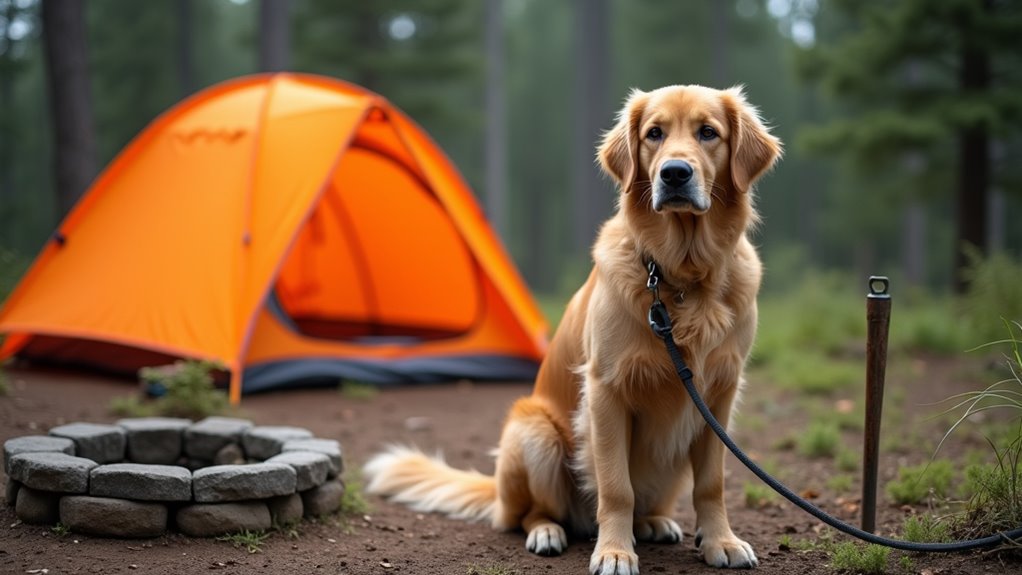
While your furry companion might be the perfect hiking buddy at home, camping environments present unique challenges that require extra vigilance. Keep your pet leashed at all times, even if they’re well-behaved. Wildlife encounters can trigger unpredictable reactions, and your dog might chase animals or disturb nesting birds.
Always clean up after your pet immediately. Pack waste bags and dispose of them properly in designated trash receptacles. Don’t leave waste behind, even buried.
Respect quiet hours by preventing excessive barking or whining that disturbs other campers. Bring familiar toys and bedding to keep your pet comfortable and calm.
Check campground pet policies before arriving. Some areas restrict pets from trails, beaches, or certain zones. Keep vaccinations current and carry documentation.
During winter camping, pets may require additional protection from cold temperatures and extra monitoring for signs of hypothermia or frostbite.
Common areas like restrooms, picnic tables, and water spigots become shared spaces that require consideration from everyone. You’ll want to keep your time at these spots brief, especially during busy periods. Don’t monopolize picnic tables for hours when others are waiting, and avoid spreading your gear across multiple tables.
Clean up after yourself immediately. Wipe down surfaces, dispose of trash properly, and leave areas better than you found them.
At water stations, fill your containers quickly and step aside for the next person. Don’t wash dishes or personal items here unless specifically permitted.
Keep noise levels down in common areas since sound carries easily outdoors. Remember that you’re sharing these spaces with families, solo campers, and people seeking peaceful experiences in nature.
Whether you’re embarking on camping adventures locally or internationally, these courteous practices will enhance everyone’s outdoor experience.
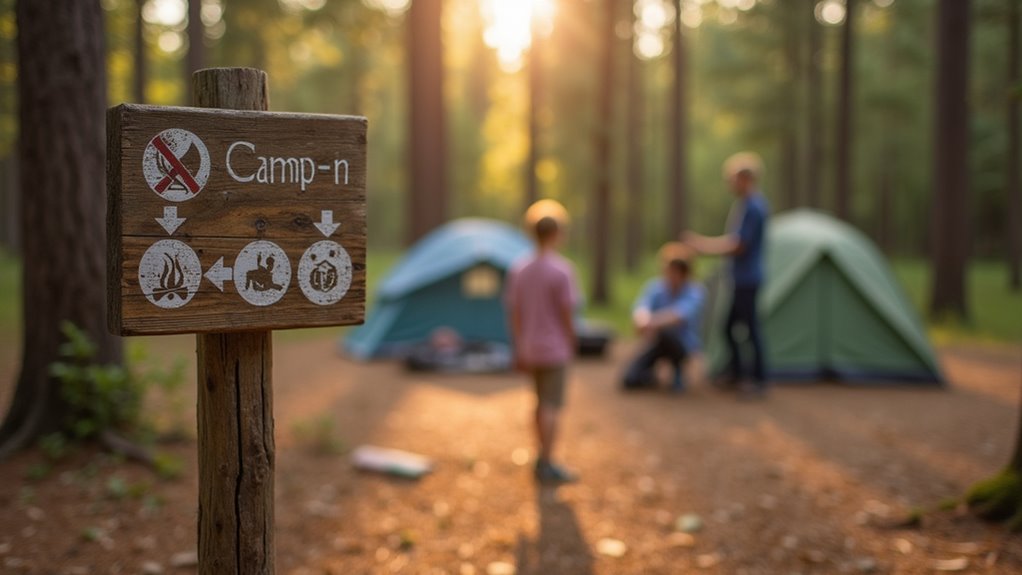
Every campground operates under specific rules designed to protect both visitors and the natural environment. You’ll find these regulations posted at entrances, office buildings, or campsite bulletin boards. Read them thoroughly upon arrival and ask staff if anything’s unclear.
Common rules include quiet hours, fire restrictions, pet policies, and check-in/check-out times. Some campgrounds prohibit alcohol, restrict generator use, or limit the number of people per site.
You might encounter specific guidelines about where you can park, dump waste, or collect firewood.
Don’t assume rules are suggestions—they’re enforceable policies. Rangers and campground hosts monitor compliance and can issue warnings or ask you to leave for violations.
Following these guidelines ensures everyone enjoys their outdoor experience while preserving the area for future campers. By practicing responsible camping, you contribute to a better outdoor experience for all visitors and help maintain these natural spaces for generations to come.
Although weather can change rapidly in outdoor settings, proper preparation keeps you safe and comfortable during your camping trip. Check weather forecasts before departing and pack accordingly. Bring layers for temperature fluctuations, waterproof gear for rain, and extra clothing in case items get wet.
Create an emergency kit containing first aid supplies, flashlights, extra batteries, matches in waterproof containers, and emergency food. Know your campground’s emergency procedures and locate the nearest ranger station or help center.
Share your camping plans with someone reliable who isn’t joining your trip.
Download offline maps to your phone and carry physical backups. Pack a whistle for signaling help if needed. Stay flexible with your itinerary – sometimes weather requires plan changes for safety. Many campers who enjoy fly fishing should research prime locations and seasonal conditions as part of their trip planning process.
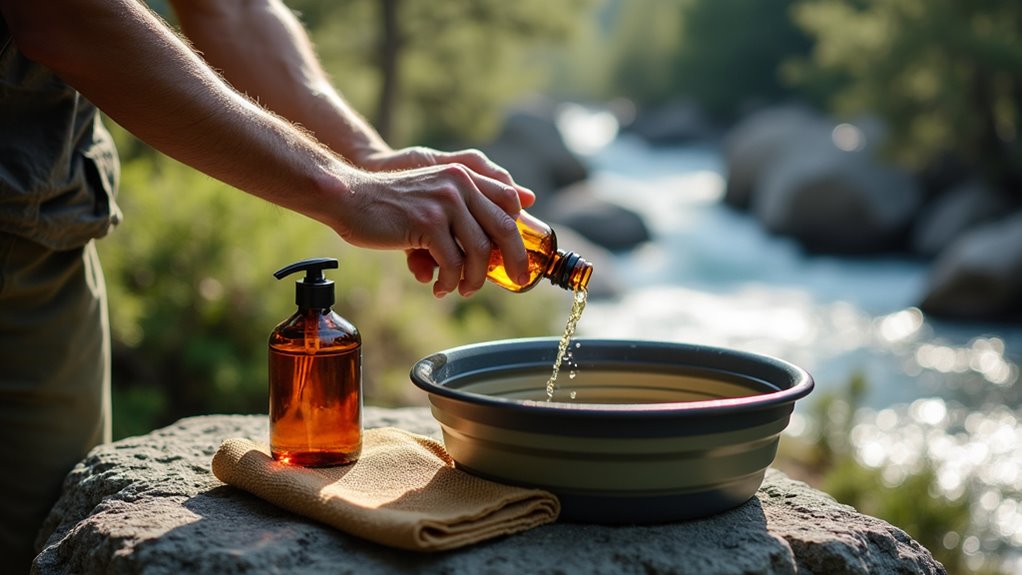
While maintaining personal cleanliness remains important during camping trips, you’ll need to adapt your hygiene routine to protect the surrounding environment.
Use biodegradable soap and wash dishes, clothes, and yourself at least 200 feet from water sources to prevent contamination. Strain food particles from dishwater and scatter them away from camp.
For personal washing, use a portable basin or solar shower rather than bathing directly in lakes or streams.
Pack out all toiletries containers and hygiene products. Choose unscented products to avoid attracting wildlife.
When brushing teeth, use biodegradable toothpaste and spit into a cathole dug 6-8 inches deep, away from water sources.
Consider wet wipes for quick cleanups, but pack them out—never bury them.
After your camping trip, make sure to properly clean and store your gear during the off-season to maintain its condition and extend its lifespan, especially when storing camping gear through harsh winter months.
You’ll create memorable camping experiences by respecting quiet hours, choosing thoughtful campsites, and following Leave No Trace principles. You’ll build community by keeping your area clean, respecting others’ privacy, and sharing common spaces considerately. You’ll guarantee safety by following campground rules, preparing for emergencies, and practicing good hygiene. Remember, you’re not just camping—you’re preserving nature’s beauty, fostering outdoor friendships, and creating lasting memories that’ll inspire future adventures.